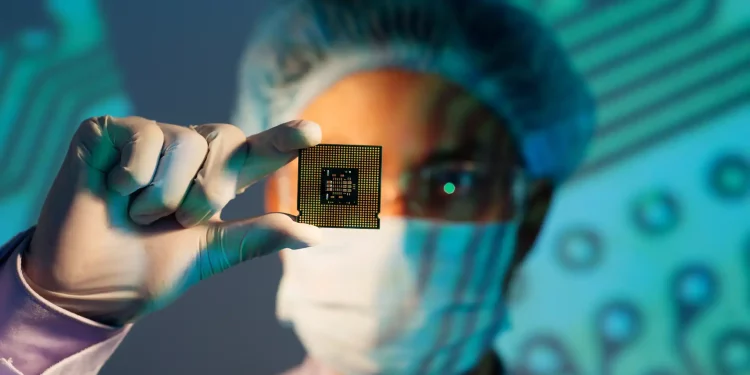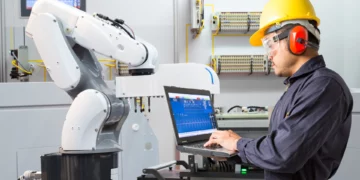The vulnerability of the chip industry recently got exposed during the rise in tensions between China and Taiwan. Taiwan Semiconductor Manufacturing Company (TSMC) is the largest player in the chip manufacturing industry, enjoying a monopoly of over 90% in high-performance chip manufacturing.
Although there are several thousands of companies across the globe, they tend to be insignificant in some or other ways in catering to the increasing global demand. Chip making requires highly skilled labor, billions of dollars in R&D, rare minerals like germanium and gallium arsenide, silicon wafers, and much more. A very small number of companies possess the resources to make a mark in the industry. This shortage of suppliers, along with increased demand, has resulted in severe shortages worldwide.
Artificial Intelligence requires chips that can process huge amounts of data seamlessly with massive computing power capacity. Demands for such powerful chips have uncovered loopholes in the supply chain, hampering the development of artificial intelligence models. Both small and big businesses have been affected due to supply shortages, even the industry leaders like Alphabet, Meta and Microsoft.
In a recently published annual report by Microsoft, they confirmed an elongated absence of chip supply for AI purposes. The report warned about the presence of graphic processing units (GPUs) as a potential risk to investors. These units are essential hardware that is capable of conducting numerous analytical calculations required for the training and implementation of artificial intelligence algorithms.
Microsoft highlighted in their report that they are constantly working to expand the capacities and number of data centres besides enhancing server capacity to meet consumer demand. GPUs have become an integral part of their data centres that are built on permissible and constructible land with appropriate availability of networking and power supply.
Microsoft’s commentary on the importance of GPUs has unravelled the need for computing power to effectively run AI servers. This has a direct impact on companies building AI software and indirectly affects businesses and end consumers that wish to receive the technology for personal or professional uses.
Even the CEO of OpenAI, Sam Altman, confessed in front of the Senate that shortage of GPUs has made it troublesome to run their flagship AI chatbot, ChatGPT. He said that they are unable to meet the requests of users on a real-time basis, and it would be a great relief if fewer people used the tool for the time being.
Effect on building AI tools
During the pandemic, the world faced similar shortages of semiconductors, but those were mainly in consumer-oriented products like electronics, automobiles, etc. Manufacturing delays, lack of labour, and halt in transportation facilities skyrocketed prices for end consumers.
This time the shortage occurred due to a sudden surge in demand for ultra-high-end GPUs that are used for developing the backend of AI tools. Suppliers have a limited production capacity for such ultra-high-end GPUs, unlike consumer-focused GPUs. Industry analysts comment that neither the manufacturer had anticipated such a demand rush nor the industry was equipped with the capacity to handle the surge in demand.
Raj Joshi, senior vice president at Moody’s Investors Service, who also tracks the chip industry, said that there is one company that will reap enormous benefits out of this supply crunch. Nvidia is a trillion-dollar chip manufacturer that happens to control 84% of the market for sophisticated high-power semiconductors. He estimated that Nvidia is going to taste unparalleled revenue growth in the upcoming quarters. The revenues would outpace its data centre business, surpassing its competitor Intel and AMD combined.
Problem with GPU makers
Production of chips has been crippled by a lack of supply, but even the GPU manufacturers are unable to get their hands on the raw materials. This has further escalated the shortage. Silicon interposer, a technology that functions by integrating discrete computing chips with chips having high-bandwidth memory (HBM), is an essential element in the process of making GPUs.
The White House has prioritised increased chip production for the national interest. Last year, they passed the CHIPS Act, which aims to invest billions of dollars in the indigenous chip industry and also into chip research & development for further innovation. This funding covers a wide range of areas in the chip industry and is not focused on the current problem of increasing the production of GPUs.
Sid Sheth, founder and CEO of an artificial intelligence startup, d-Matrix, said that the shortage could give birth to innovative, creative solutions, pushing companies that don’t receive chips to become more efficient. He added that now companies don’t have their regular supply of computing power technology, they will be forced to squeeze out the resources at hand in a more efficient way. This means using less powerful smaller AI models to train or invent ways of computing without being dependent on GPUs.
















